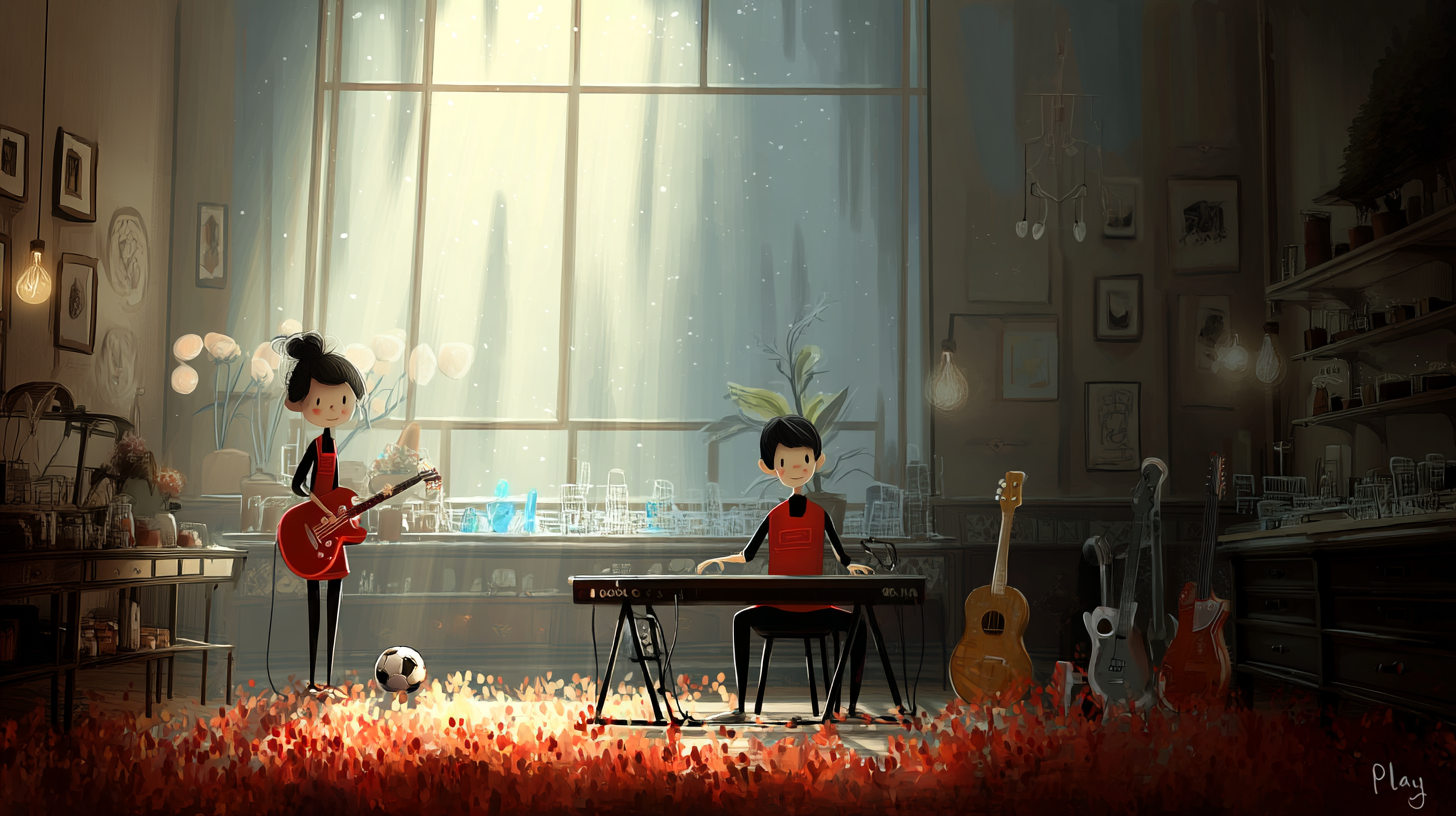“Play” means to have fun, make music, do sports, or act in a show.
「play」は、遊んだり、楽器を演奏したり、試合をしたり、お芝居をすること。
以下は英単語 “play” に関するストーリー型学習コンテンツです。まずは大枠の意味を理解して最後の文章で確認しましょう。
主な意味(main meaning)
| 品詞 | 発音記号 | 意味 | 英語例文 |
|---|---|---|---|
| 動詞 (自/他) | /pleɪ/ | 遊ぶ、演奏する、試合をする、役を演じる | The children played in the park all afternoon. |
| 名詞 | /pleɪ/ | 遊び、劇、試合 | We watched a play at the theater last night. |
語源(etymology)
「play」は古英語「plegian(運動する、遊ぶ)」から来ており、「軽やかに動く」ことが元のイメージ。
類義語(synonyms)
| 類義語 | 英語例文 |
|---|---|
| perform | She performed a beautiful song. |
| act | He acted in the school play. |
| compete | They competed in a national tennis match. |
| engage | The kids engaged in fun outdoor games. |
| amuse oneself | He amused himself by playing the guitar. |
反義語(antonyms)
| 反義語 | 英語例文 |
|---|---|
| work | He worked all day and didn’t have time to play. |
| rest | She decided to rest instead of playing outside. |
コロケーション(collocations)
| コロケーション | 英語例文 |
|---|---|
| play a game | Let’s play a game of cards. |
| play the piano | She can play the piano beautifully. |
| play soccer | We played soccer after school. |
| play a role | He played the role of Hamlet in the play. |
| play with toys | The baby loves to play with her toys. |
2項表現(binomials)
| 2項表現 | 英語例文 |
|---|---|
| play and learn | Children can play and learn at the same time. |
| trial and error | Learning to play guitar takes trial and error. |
英語ストーリー(english story)
Title: A Day of Play and Learning
It was a sunny Saturday morning. Kenji decided not to stay home and work on his homework. Instead, he wanted to go out and play.
He met his friends at the park, and they started to play a game of soccer. Kenji had been practicing hard and wanted to compete in next week’s school match. After the game, they sat under a tree and talked about the school play. Kenji had been chosen to play a role in the drama. He was excited but a little nervous. “I’ve never acted on stage before,” he said. “Don’t worry,” said Aiko. “It’s like a game. Just amuse yourself and have fun.”
In the afternoon, Kenji went home and began to play the piano. Music helped him relax and feel happy. He remembered that it’s good to play and learn every day.
That evening, his parents took him to a theater to see a famous play. “You’ll enjoy it,” his father said. “It’s full of trial and error, just like learning to act.” Kenji laughed. He felt ready to perform next week.
和訳
タイトル:遊びと学びの一日
土曜日の朝、天気は晴れ。ケンジは家にこもって宿題を**work(する)のではなく、外に出てplay(遊ぶ)**ことにした。
彼は公園で友達と合流し、サッカーの**play a game(試合をする)を始めた。ケンジは来週の学校の試合にcompete(参加)するために、練習を頑張っていた。試合の後、みんなで木の下に座って学校のplay(劇)の話をした。ケンジはその劇でplay a role(役を演じる)ことになっていた。うれしかったが、少し緊張もしていた。「ステージでact(演じた)**ことなんてないよ」と彼は言った。「大丈夫」とアイコが言った。「ゲームみたいに、**amuse yourself(楽しんで)**すればいいよ。」
午後になると、ケンジは家に戻って**play the piano(ピアノを弾く)時間にした。音楽は彼の気分を落ち着かせ、幸せな気分にしてくれた。毎日play and learn(遊んで学ぶ)**ことが大切だと彼は思い出した。
その夜、両親が有名な**play(劇)**を見に連れて行ってくれた。「きっと楽しめるよ」と父が言った。「**trial and error(試行錯誤)**の連続で、演技の練習と同じさ。」ケンジは笑った。そして、来週の舞台が楽しみになった。
Q&A
「play」と「perform」の違いは?
「play」は遊ぶ、演奏する、試合をする、役を演じるなど幅広く使える動詞です。一方「perform」は「上演する」「実演する」「演奏する」といった意味で、観客の前で何かを披露するときによく使います。つまり、「perform」はよりフォーマルで、舞台や人前での行動に焦点があります。
「play」と「act」の違いは?
「play」は役を演じるという意味もありますが、「act」はより演技自体に注目した言葉です。舞台や映画などで役をこなすという点では似ていますが、「act」は「演技すること」そのものを強調します。たとえば、”He acted well in the movie.”は演技力の話です。
「play」と「compete」の違いは?
「play」は遊びや試合をする意味で使われ、勝ち負けにこだわらない文脈でも使えます。一方、「compete」は「競う」「対抗する」という意味で、勝ち負けが重要な試合や大会に使います。つまり、「play」は気軽に楽しむ場合にも使えるのに対して、「compete」は本気で勝負する場面に使われます。
「play」と「engage」の違いは?
「engage」は「何かに関わる」「参加する」という広い意味を持ちます。「play」は遊びやスポーツなどに楽しく参加する意味で使われますが、「engage」は必ずしも楽しいことに限らず、真面目な活動(例:議論、プロジェクト)にも使われます。
「play」と「amuse oneself」の違いは?
「play」は行動を直接表すのに対し、「amuse oneself」は「自分を楽しませる」という間接的な表現です。たとえば、「play the guitar」は具体的な行動ですが、「amuse oneself by playing the guitar」は「ギターを弾くことで気を紛らわせたり楽しんだりする」というニュアンスになります。
「play」と「work」の違いは?
「play」は楽しむ、くつろぐ行動を表しますが、「work」は労働や勉強など、義務や責任に関わる行動を表します。対照的な意味を持ち、「遊ぶか働くか」という場面でよく対比されます。
「play」と「rest」の違いは?
「play」は体や頭を使って積極的に楽しむ行動、「rest」は体や心を休める静かな行動です。「play」は動きがあり、「rest」は動きを止めることが特徴です。



コメント